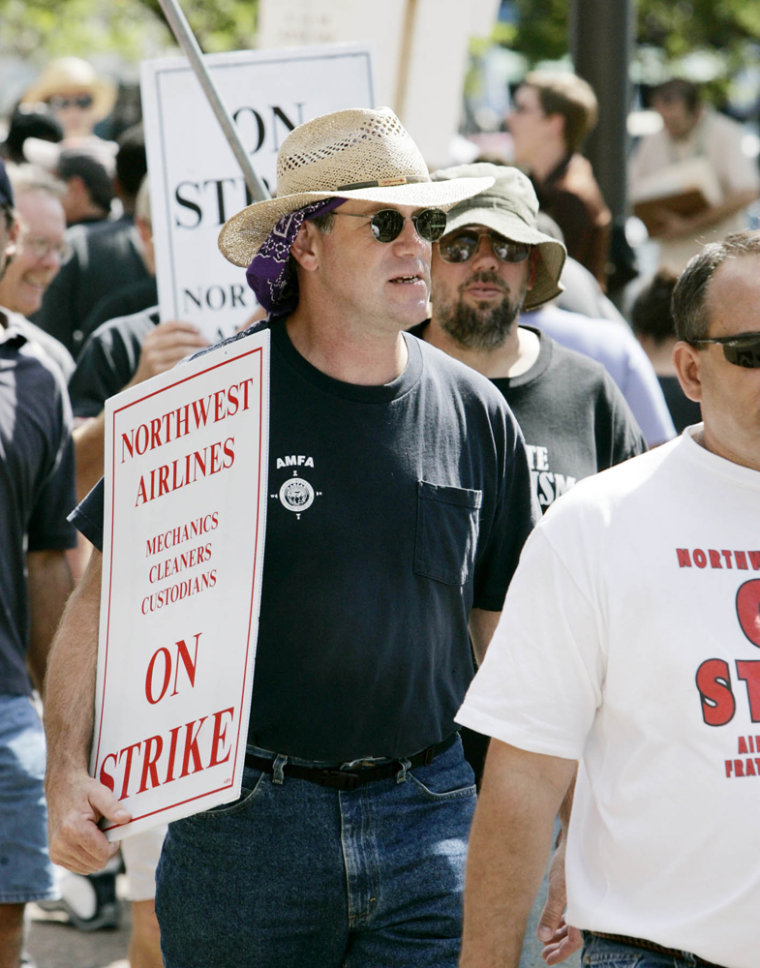Striking Northwest Airlines mechanic Russ Christenson hands out lime-green fliers asking passengers not to fly on his airline. Many of them offer words of support before disappearing through the airport's sliding glass doors. Many lament the airline's use of replacement workers. And then they fly on Northwest anyway.
Every day, thousands of Northwest passengers, replacement workers, and other unionized Northwest workers walk past Christenson and other strikers at Minneapolis-St. Paul International Airport. Northwest flights are running about as full as they were before the strike, and the carrier has claimed that bookings are strong. Labor experts said a picket line this porous doesn't bode well for the strikers.
The strikers are on their own against "a very determined employer and a large pool of replacement workers," said Gary Chaison, an industrial relations expert at Clark University in Worcester, Mass. "If things remain the same and continue on this path, then the strike would be doomed."
About 4,400 mechanics, cleaners, and custodians walked out Aug. 20 rather than accept 25 percent pay cuts and layoffs that would have halved their work force. Northwest lost $4 million a day during the first half of this year, under pressure from rising fuel prices and competition from discount carriers.
Northwest immediately replaced the strikers with temporary workers, contractors and vendors — and kept flying. However, the airline has acknowledged its performance suffered in the days just before and just after the strike began.
The striking Aircraft Mechanics Fraternal Association has been on its own. It's not part of the AFL-CIO, the labor federation with 9 million members in 54 unions who would be more inclined to honor a strike by other members.
AFL-CIO President John Sweeney said on Tuesday that he doesn't think AMFA's strategy will work, and criticized it for failing to reach out to other unions.
And AMFA is controversial within the labor movement. Rather than organizing nonunion mechanics, AMFA got its two biggest airlines — Northwest and United Airlines — by persuading workers to switch from the International Association of Machinists.
"This is a small union, and it doesn't have any allies, because it's kind of a pariah in the labor movement," Chaison said of AMFA.
AMFA has said that safety concerns will push passengers to switch airlines as the strike drags on. Chaison called that "the only thing the union has going."
"This is a strike that will be determined by the consumer," he said. "If they feel that flying is chancy, and safety is an issue, then they could swing very quickly over to the union side."
That's how retired truck driver Garwood Knutson of Albuquerque, N.M., saw it.
"If Northwest cannot prove they can continue reliable service with the replacement mechanics, I would be concerned," he said, holding his Northwest boarding pass for his flight home after visiting family here. "I would be looking for alternate carriers."
"The longer it lasts, the more desperate (Northwest) gets, the more concerned I get," said passenger Ray Schnichels of Gainesville, Fla.
Christenson, the striking mechanic, said he believes travelers will begin to shy away from Northwest more once the fliers who booked before the 11-day-old strike have used their tickets.
"They're still flying off the maintenance we've done," he said. He believes replacement workers will fall behind and maintenance problems will drive passengers to other airlines, eventually. With his Northwest-paid health insurance expiring Wednesday and his last paycheck coming on Friday, his finances depend on that.
Tom Verhulst, a custodian for almost 15 years at Northwest, said passengers have little choice but to fly Northwest out of its hubs. It carries 61 percent of passengers who originate in the Twin Cities and 59 percent of those who originate in Detroit, its two largest domestic hubs.
"It's very frustrating," he said of passengers' willingness to cross the picket line. "I don't think they understand the fight. Northwest has too much of a monopoly here."
Verhulst spoke while picketing a hotel that is housing replacement workers. A few minutes earlier, as the group of about 100 pickets walked across the hotel's driveway, an impatient cabbie honked, trying to get through the crowd. This time, the line held.
